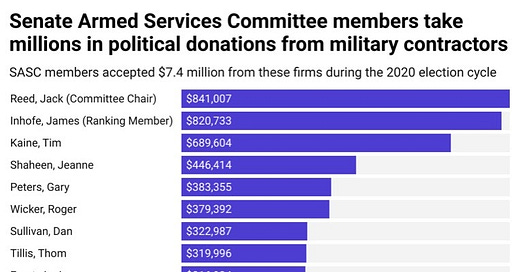Senate committee adds $25 billion to Biden's military budget
Speaking Security Newsletter | Advisory Note for Organizers and Candidates, n°97 | 22 July 2021
If you find these notes useful, you can support this newsletter here and SPRI, here. Sharing these newsletters also helps. Thank you!
*See update to yesterday’s note (I had left a chart out of the original post).
Situation

Context
This figure refers only to the Pentagon discretionary budget. So it excludes things like nukes, miscellaneous and mandatory spending, etc. With the $25 billion increase approved by the Senate Armed Services Committee, Biden’s budget just for DOD has ballooned to what this year’s military budget was including all that other stuff (so about $740 billion).
More context
Armed Services committees are powerful because they design the annual military policy bill (the NDAA). The NDAA says how much DOD can spend and on what. Congressional appropriators ultimately decide to what extent they fund authorized programs, but once this committee approves its version and sends it to the whole chamber for review, it’s a lot harder to make substantial changes to military policy/spending. In short, the House and Senate Armed Services Committees (HASC and SASC) have a lot of power.
Military industry knows this, which is why they give a ton of money to representatives and senators who sit on these committees. The military budget is the primary vehicle for federal subsidies for these firms, and the HASC/SASC members have a lot of control over what ends up in the budget and how much.
Here’s how much Senate Armed Services Committee members took from military contractors last election cycle (data via Open Secrets). Elizabeth Warren was the only one to object to the topline figure:
*The average amount a SASC member took from military contractors last election cycle was $282,716. Among non-SASC members, it was $165,926.
Thanks for your time,
Stephen (@stephensemler; stephen@securityreform.org)
Find this note useful? Please consider becoming a supporter of SPRI. Unlike establishment think tanks, we rely exclusively on small donations.



